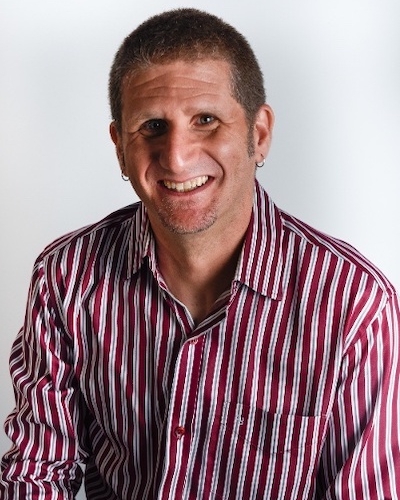Monday Mentors: Meet Sam Schindler, Academic Bridge Mentor
Monday, October 30th, 2023

Making the leap from high school to college doesn’t always go smoothly: and when a student needs help, they may not know where to turn for resources that will get them the assistance they need.
At PCA&D, Sam Schindler makes sure that gap in knowledge is eliminated in his position as Academic Bridge Mentor. That means he works with students to help them find resources by first helping them determine what help they actually need — and then setting them on the path to success.
Can you share a little background of how this position came to be?
Sam Schindler: I think this position came about organically. During my third year of teaching FVC at PCA&D, I began teaching a larger number of sections of students and in so doing began to become familiar with the majority of (first-year) Foundation students. I try to build personal relationships with all of my students in order to learn how to best build each one’s unique skill set within the realm of Verbal Communications. As a result, I get to know them fairly well and in turn they come to know and trust me (To my mind, this is the foundation of effective pedagogy). As it happened, they began to share some of the obstacles that hindered them from consistent academic success. The list was varied and I tried to help where I could. Administrators took note of this and chose to create a new position within the school administration that would, in an official capacity with corresponding resources, meet the wide range of needs that Foundation students have as they navigate their first year of college, which is often their first experience living away from home.
Do you see the needs of the incoming class changing from year to year, or has it been pretty consistent?
SS: The biggest change has been between students whose latter high school experiences were deeply affected by Covid and those who were younger, and therefore had more traditional junior and senior years which culminated in “normal” graduation ceremonies. In brief, what I noticed was that those more immediately affected by the Covid shutdown had a rough time acclimating to the new rhythms of a college lifestyle, struggling with basic things like taking care of themselves and carving out sufficient time to get their work done for classes.
Can you share a bit about what the needs are of some incoming students, and what kinds of skills you work on during the transition to college?
SS: As alluded to above, for some students the transition from life as they’ve known it for their formative years to college is jarring, and they can have a more difficult time learning how to set efficient work schedules for themselves, maintain healthy habits, and adhere to daily routines. For others, the obstacles can be more pointedly academic, in that they struggle with submitting work in a timely manner or asking for a specific kind of help for a specific class or assignment. One of the most important skills I help students cultivate is the ability to pinpoint what their particular need is, for example, when it comes to doing research, paper-writing, or presenting in class. If they know what to ask for, they’re much more likely to get help that’s useful and productive.
There are also students who need support of a more professional nature, such as in the arena of mental health. Since I’m not a licensed therapist, I do my best to direct them to the most appropriate kind of support in a given situation. One thing I find in common with all of these circumstances is that often, my most effective response is to just listen and validate a student’s feelings.
Do you meet with Foundation/Transfer students as groups, one-on-one, or both?
SS: My experience is that both of these circumstances occur. Meetings can also be both formal or informal. Sometimes, after class, a small group of students who are facing a similar problem will come up to me and openly share what’s troubling them. Other times I’ll seek students out and set up a more formal meeting with them to address a particular issue. These different approaches are usually determined by the students’ personalities and preferences.
What do you find most rewarding about this role?
SS: A couple things I try to bring to this job are an open mind and a willingness to be compassionate instead of judgmental. I find that when I show them that I trust them and treat them as the adults they are and take them seriously, they are much more likely to reciprocate, treat me with respect, and trust me enough to share their stories, some of which are characterized by real and enduring hardship and pain. I derive a sense of satisfaction when I see that I’ve made something easier for one of them, even the tiniest thing like getting a thumb drive or the key to a laundry room. What’s most rewarding is when students return to talk with me more, even when the immediate crisis has been dealt with.
Are there other PCA&D services, such as studio tutors or the Writing Center, that you coordinate with when offering assistance to students?
SS: I refer students to the Writing Center very often, as well as to other academic mentors whose purviews are things like time management and other measures of academic support. I also have occasion to connect students with non-academic groups and clubs so they can further their extracurricular interests and more readily acclimate into PCA&D’s social life offerings.
